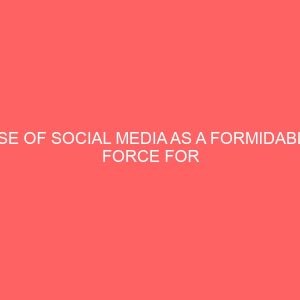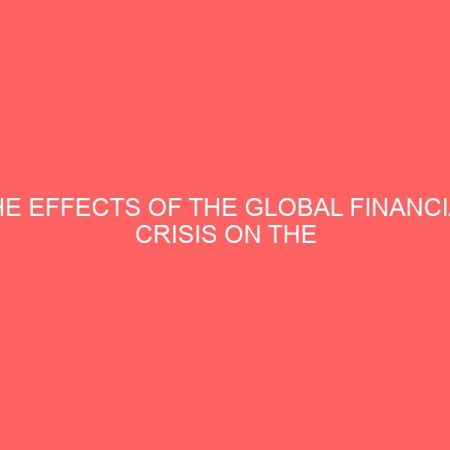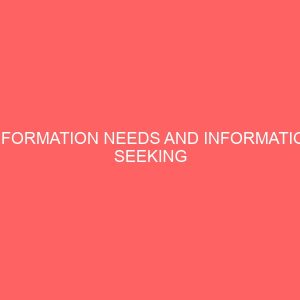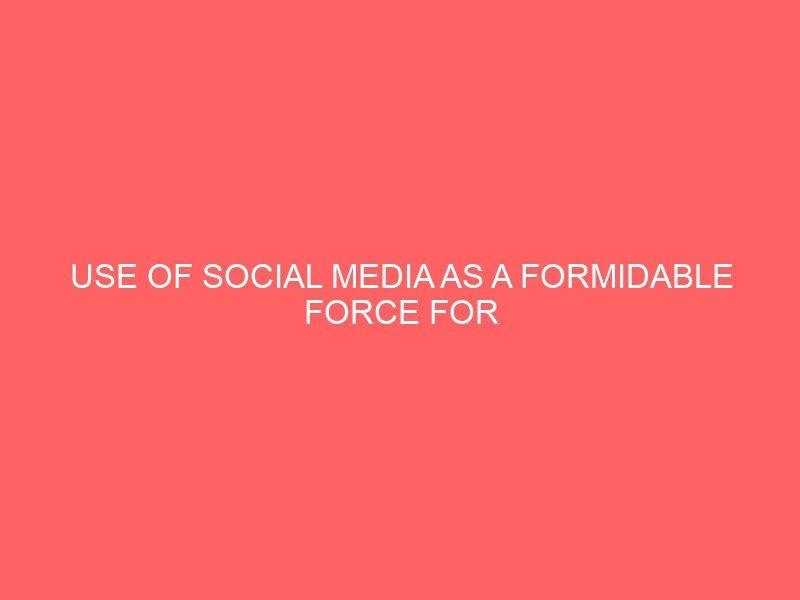Description
CHAPTER ONE
INTRODUCTION
1.1 BACKGROUND OF THE STUDY
Democracy is widely acknowledged as the best form of government in most parts of the world today. Elections, which represent the most modern and universally accepted process through which individuals are chosen to represent a body or community in a larger entity or government is one of the cardinal features of democracy (Nnadozie, 2007).This is so because in a democracy, the authority of the government derives from the consent of the governed. This is perhaps why democracy is commonly referred to as “the government of the people by the people and for the people”. Usually, a democratic election would characteristically be competitive, periodic, inclusive, definitive and free and fair (Chukwu, 2007).
Nigeria’s democracy may be considered nascent when compared to the older democracies of the western world. Be that as it may, the 2011 general election has gone down in the history of the country as one of the best elections in the last few years of uninterrupted civilian rule in the land. Udejinta (2011) observes that “one remarkable thing about the 2011 general elections was the adoption of social media especially the facebook by the politicians, the political parties and the electorates as a platform for political participation”. The importance attached to social media in the 2011 general elections was better explained by President Goodluck Jonathan decision to declare his intention to run for the highest political office in the land on facebook.
Jonathan had on Wednesday, September 15, 2010 informed his 217,000 fans on the world’s most popular networking platform (facebook) of his intent; 24 hours later, 4,000 more fans joined his page, and by the day of the election, on 16 April 2011, he had over half a million followers. His closest rivals – Alhaji Mohammed Buhari of the CPC, Nuhu Ribadu of the ACN and Alhaji Shakarau of the ANPP were also among those that made heavy presence on facebook and other social media platforms. In addition to the approximately 3 million registered Nigerians on Facebook and 60,000 on Twitter, almost every institution involved in Nigeria’s elections conducted an aggressive social networking outreach, including the Independent National Electoral Commission (INEC), political parties, candidates, media houses, civil society groups and even the police (Adibe, Odoemelam and Chibuwe 2011).
Apart from the presidential candidates, many governorship aspirants, senatorial and house of assembly seat contenders from the various states of the federation also embarked on aggressive use of social media platforms especially the Facebook to disseminate their political messages, woo electorates and support groups towards the actualization of their goals.
Before the advent of the new media, the older or conventional media – radio, television, newspapers, magazines, etc, ruled the world, and had directly or indirectly blocked popular participation in the electoral process. This is because there has always been scarcity of space and airtime given by the conventional media to the citizens to have their say in politics, governance and in the electoral process. Conventional media critics such as (Graber, 1976; Fallows 1996; Blumler and Gurevitch, 1995) cited in Abubakar 2011) thus believe that voters were left with paid political propaganda containing only meaningless slogans, making them disinterested and cynical about politics. They argue that there is absence of serious debate in the conventional media that could make people to learn the substance of issues and policies proposals as well as related arguments, and that this disallows citizens from participating actively in political discourse.
Meanwhile, social media are interactive, web-based media. They belong to the new genre of media that focus on social networking, allowing users to express themselves, interact with friends, share personal information, as well as publish their own views on the internet. The ubiquitous access of these online devices no doubt, has democratizing effects as they offer citizens opportunities for more fully engagement in the political process. This means that voters have become more than just passive consumers of digital messages; they are now creators of the messages.
Writing on this development, Kuhus (2011) in his paper “Life in the Age of Self-Assembling message” cited in Adibe, Odoemelam and Chibuwe (2012) observes that:
The value of the communication experience has undergone a sea-change; from the need to share it, to the need to share in it. Technology and social media in particular have brought power back to the people; with such technologies, established authorities are now undermined and users are now the experts.
This implies that people can now consume media as wanted and needed rather than allowing media producers to schedule consumption time and content. A person can now communicate to anywhere from any place at any time. Again, using social media is less expensive than the outrageous political advertisements on the older media. The new media is flexible, accessible and affordable. They promote democratization of media, alter the meaning of geographic distance, and allow for increase in the volume and speed of communication. They are portable due to the mobile nature; they are interactive and open to all. Nigeria experimented the use of this technology for political discourse during the 2011 general elections. The platform gave voice to many Nigerian politicians and electorates alike to make their voice heard in the electoral process. Regardless of the successes, many lapses were observed and many lessons abound for future elections in the country. That forms the focus of this paper.
Therefore, the use of the new media in today’s political space is somewhat indispensable to all political stakeholders. The Electorate, Political Parties, the Electoral Management Bodies (EMB), Civil Societies, the Media and the International Community all find use for it. Over time, the political dynamics in the third world, particularly in African states have been influenced by certain factors. These factors have made democracy more prevalent as a system of government in Africa, and are expected to bring about good governance in Africa where it lacks. They include: The tolerance of the International Community like the United Nations, African Union and regional bodies like the Economic Community of West African States (ECOWAS), for unpopular systems of government like military rule or coup d’état, dictatorship and illegal tenor elongation is fast approaching zero. Within the West African sub-region, the ECOWAS protocol on democracy and good governance stipulates “zero tolerance for power obtained or maintained by unconstitutional means” it further clarifies that recognition of accession to power shall only be “through free, fair and transparent elections” (ECONOMIC COMMUNITY OF WEST AFRICAN STATES Executive Secretariat, 2001).
These factors are significant developments because “the people” for whom democracy is intended is more informed, politically empowered and socially protected. This translates to political energy which he expresses during elections in his home country. It is however worthy to note that emphasis is not only on the adoption of democracy but also on the entrenchment of the best practices of democracy and good governance.
In the Nigerian case, the Independent National Electoral Commission (INEC) accepts that the applications of new media technologies in the electoral process show great promise but it also has identified challenges, vulnerabilities and weaknesses (Nwangwu, 2015). It is therefore crucial to take a holistic step and understudy all its roles, uses and applications, by all the stakeholders, with a view to using this tool to positively reinforce the Nigerian electoral system.
1.2 STATEMENT OF THE PROBLEM
The use of social media as a formidable force for social engineering and political electioneering has continued to grow. The technology is participatory, interactive and cost-effective. This has made it the medium of the moment as far as political communication and participation are concerned. Nigeria had her first true test of social media use for political participation during the 2011 general elections. Many positive results were recorded. For instance, both the local and foreign observers rated the election as the best in the fourteen year history of unbroken democracy in the country.
However, a Human Rights Watch report of April 18, 2011 says that although the April elections were heralded as among the fairest in Nigeria’s history, they also were among the bloodiest”. The reports further show that a total of not less than 800 persons were killed, more than 65,000 others displaced and over 350 churches either burnt or destroyed in the violence that precipitated the announcement of the 2011 general elections results in the northern states of Adamawa, Bauchi, Borno, Gombe, Jigawa, Kaduna, Kano, Katsina, Niger, Sokoto, Yobe and Zamfara by Muslim rioters.
Adeyanju and Haruna (2011) believe that social media played a huge role in instigating and fuelling the violence. They argue that during the period, many Facebook pages were awash with false rumors and gossips that added to hitting up the polity and creating unnecessary tensions. The GSM short message service (SMS) was used to spread false election results that differ from what INEC eventually announced. This made electorates believe that their votes did not count and that they were massively rigged. There was what Okoro and Adibe (2013) refer to as “social media war” on the various social media platforms, making use of all kinds of abusive languages, all manner of attacks and counter attacks among members and supporters of various opposition parties and groups. Several insulting and inciting messages flourished on facebook and GSMSMS.
These culminated in the violence and tensions witnessed before, during and after the elections in many parts of the country, with some states ordering non-indigenes to leave. The researchers believe that if a study of this nature is ignored, the lapses of the first experiment would reoccur in future elections, resulting in another set of election related violence, bloodbaths, unwonted destruction of property and creation of unnecessary tensions and panics not only in the country, but in the West African sub-region and the African continent at large.
1.3 OBJECTIVES OF THE STUDY
It is necessary t state that the primary objective of this study is to evaluate the roles of the new media in the Nigerian electoral process. The specific objective of this study includes:
- To understudy roles, uses and applications of the new media by stakeholders during the Nigeria 2015 presidential elections.
- To investigate if truly the social media is effective in the reportage of the choice of political candidates to the electorates
- To determine the role social media played in the political participation of Nigerians during elections.
- To discover the lapses in the use of social media for political participation in Nigeria during elections.
- To determine the role social media played in the political participation of Nigerians during the elections.
- To evaluate the adherence to the basic human rights as upheld by international best practices during elections with specific interest in online press freedom, online hate speech and media bias.
- To determine the impact of the use of new media professionals on the outcome of the elections.
- To understudy the roles public diplomacy played in the Nigerian electoral process.
- To determine the roles social media participation played during the election with specific interest in citizen journalists and Nigerians in the Diaspora.
- To identify lacuna in the Nigerian constitution with regard to the use of new media technologies to support the electoral system.
1.4 RESEARCH QUESTIONS
- Do you think the social media plays inestimable roles in the reportage of political updates?
- Do you agree that social media play a significant role in enhancing political participation?
- Is the social media the most effective tool of reaching to the electorates to canvass for their votes?
- What are the lapses in the use of the social media in fostering the political reportage in the country?
- Does the reportage from the social media determine the choice of electorates during elections?
- Do you think the use of social media during electioneering process causes more harm than good to the process?
1.5 RESEARCH HYPOTHESIS
Ho: The social media play a significant role in reportage of political updates
Hi: The social media does not play a significant role in reportage of political updates
1.6 SIGNIFICANCE OF THE STUDY
This study will be of immeasurable importance to journalists, media organizations, news agencies, editors, lecturers and students in the field of journalism and mass communication as well as other researchers who will want to embark on same study as this.
The study will help journalists to source useful information using social media networking tools as well as provide them with a guide on how to write online stories. It will also help journalists to interact with their audience and identify their information needs. The study will also help journalists who have rarely embraced social media to do so in order to increase their productivity.
1.7 SCOPE AND LIMITATION OF THE STUDY
This study focuses on the effect of social media technologies during the electioneering period in Nigeria. The major limitations of this study are:
- Cost: Subscription for online analytical tools is considered expensive. Nigeria is currently facing an economic downturn and the Naira shed a lot of value against the dollar.
- Time: The period covered by this study is 16th November, 2014 to May 29th 2016, in order to factor in good governance. This requirement compelled the researcher to conclude data gathering late relative to his submission date.








Reviews
There are no reviews yet.